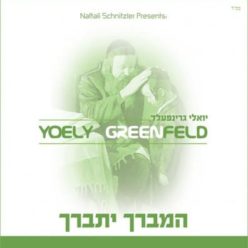T he tefillah of Shabbos Mevarechim which appeals for a month filled with blessing is a weighty one for Jews everywhere. The closing section yechadshehu is a supplication that Hashem renew upon us joy consolation sustenance peace good tidings and good news healing and recovery and speedy redemption — the words ushering us into a new time of personal and communal salvation.
When songwriter Naftali (Tuli) Weill composed the tune for what would become “Yechadshehu” back in 2007 he actually wasn’t thinking about the brachos of Shabbos Mevarechim but of the blessings that would accompany his younger brother Yanky to the chuppah. “It was actually in a faster tempo with Yiddish lyrics about the chassan cowritten by Motty Illowitz — then unknown — and myself ” Weill says. Titled “Mazel Tov Yaakov Shimon ” Weill performed the original song at the wedding before the mitzvah tantz together with top crowd-pleasers Pinky Weber and Yoeli Greenfeld.
Two years later Weill got a phone call from Yoeli Greenfeld asking if he recalled the song they had performed together at Yanky’s wedding. Greenfeld was then collating songs for his first album Hamevorach Yisborach which would emerge in January 2010. He started humming the parts of the tune he remembered over the phone but in a slower tempo than the way they’d originally sung it. Weill was immediately struck by his friend’s revelation — the slower version of the melody sounded far better than the original. Together with Naftali Schnitzler the album’s producer Weill came up with the perfect words for the slowed-down niggun: the tefillah of Shabbos Mevarechim — words of hope and prayer for the month ahead.
The result was a hit. “I believe most people experience strong feelings when they daven ‘Yechadshehu’ on Shabbos Mevarechim. Asking for all those brachos is an emotional experience and the job of the tune is to reflect that ” Weill comments.
For many composers the use of their tune in shul — to inspire and elevate prayer to a higher realm — is a major source of pride and Tuli Weill is no exception. “One Shabbos Mevarechim in 2010 soon after the song was released I was davening in a particular shul when the baal tefillah actually started ‘Yechadshehu’ with this tune while the oilem sang along. That was a very moving moment for me. I knew then that the song was not only for entertainment it’s actually being used to daven ” Weill says.
Weill who plays guitar and keyboard wrote his first song at the age of ten. With the encouragement of his family and some musical pals — including producer Naftali Schnitzler who is a childhood friend — he kept up the hobby into adulthood.
Weill says he has learned much from great musical talents with whom he’s become friendly over the years. “Musically Yossi Green probably had the biggest impact on me. I remember meeting Yossi at an event. Naturally I started asking him all types of questions about writing songs. Yossi suggested I come over to his home one evening to talk music. I took him up on the offer and this evolved into a series of informal composer workshops. Several musical friends joined us and most of us ended up publishing songs.” The frum musical world is a tight one — other attendees included Sruly Meyer (producer of Benny Friedman’s albums) and composer and badchan Motty Illowitz.
Other popular songs composed by Weill include “Mi Adir ” sung by Yumi Lowy “Yehi Ratzon ” by Beri Weber (on Beezras Hashem Yisborach) and “Mi Kamocha ” by Michoel Schnitzler (on The Wedding of the Youngest).
Today Weill spends his days creating marketing campaigns as director of life-cycle marketing at Ptex Group in New York. He sees this vocation as coming from the same instinct and drive as his songwriting. “It’s just a simple desire to create something artful and unique which affords a great sense of accomplishment. For me coming up with a creative campaign can feel just as great as writing a brand-new song.”
Feedback:
“Soon after the song was released I was on line at my local breakfast shop when a yungerman came over to say thank-you. He said his ‘Yechadshehu’ tefillah on Shabbos Mevarechim has taken on an entirely different meaning since he’s been listening to Yoeli Greenfeld sing it.” (Originally featured in Mishpacha Issue 666)



